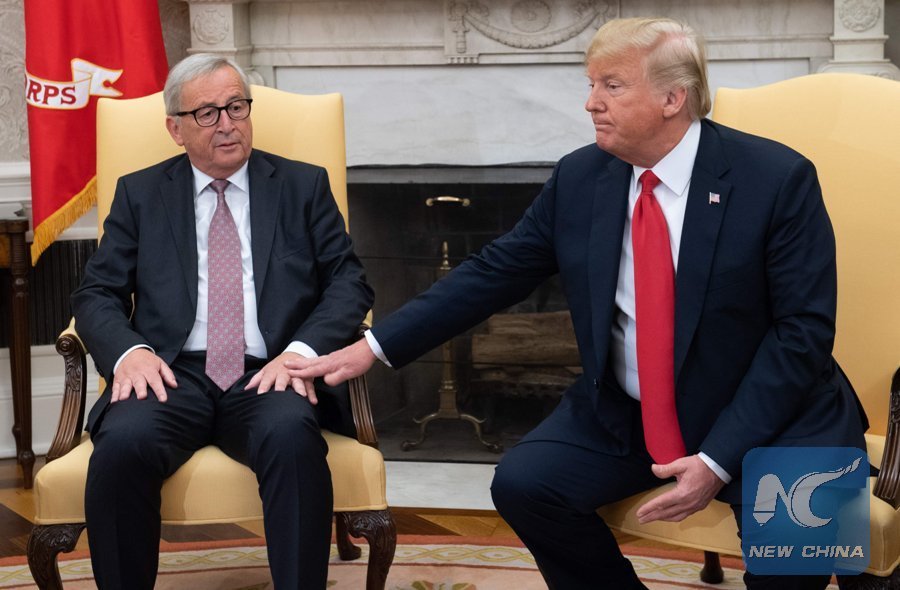
U.S. President Donald Trump meets with European Commission President Jean-Claude Juncker in the Oval Office of the White House in Washington, D.C., the United Statesm on July 25, 2018. ( AFP Photo)
WASHINGTON, July 25 (Xinhua) -- The latest deals between U.S. President Donald Trump and visiting European Commission President Jean-Claude Juncker might be the first step to ease transatlantic trade conflicts, but they failed to resolve their substantial differences, U.S. experts said on Wednesday.
At a joint press briefing after their meeting that lasted over an hour, Trump and Juncker told media that the two sides had agreed to work together toward "zero tariffs, zero non-tariff barriers, and zero subsidies on non-auto industrial goods."
They also vowed to work to increase trade in services, chemicals, pharmaceuticals, medical products, as well as soybeans, and Brussels planned to import more liquefied natural gas (LNG) from the United States.
Meanwhile, the two sides agreed to launch a close dialogue on standards, in order to ease trade, reduce bureaucratic obstacles, and set up immediately a working group to "identify short-term measures to facilitate commercial exchanges and assess existing tariff measures and what we can do about that to the betterment of both," Trump said.
While some U.S. experts saw the initiatives announced by Trump and Juncker were encouraging, they believed that the substantial differences between the two sides remained and doubted whether the deals will really be implemented.
Tori Whiting, a trade economist at Heritage Foundation, said: "The announcements today ... were an encouraging first step to put the brakes on the trade war."
Despite the stated initiatives, however, the two sides have so far failed to substantially patch up ties strained over U.S. tariffs on EU's cars and steel and aluminum.
"The White House should immediately follow up its promises to eliminate tariffs on steel and aluminum from the EU (European Union) and work to establish similar deals with other allies. The President should also suspend the national security investigation into automobile imports," said Whiting.
Besides trade barbs, the two sides have also been overshadowed by differences on Iran nuke deal, Paris climate accord, the status of Jerusalem and the share of defense spending, among others. Trump's relations with Russia have also fueled mistrust in Europe.
Darrell West, a senior fellow at the Brookings Institution, told Xinhua that "there are substantial differences between the U.S. and European Union and this meeting has not changed those things.
"Trump is critical of our European allies and feels they are not paying enough for national security. He is uninterested in free trade, climate change, negotiating with Iran, or standing up to Russia," he said.
"It is going to be very difficult if not impossible to bridge that gap," he said.
Noting that Trump's rhetoric and moves will complicate the trend of transatlantic relations, the expert said that "it will be difficult for European leaders to sell Trump's ideas to their voters and most of them aren't interested in following Trump's lead."
"The most likely outcome is the leaders agreeing to disagree on several major issues. That is something that has rarely happened in the past but has become commonplace during the Trump administration," he added.
Brookings Institution Senior Fellow Michael O'Hanlon told Xinhua that Trump's moves on trade have not yet been "in compromise mode."
"He seems to be doubling down on the strategy rather than looking to scale it back," he said.
"But I doubt we'll see much progress anytime soon,"he added.
To Juncker's reconciliatory tone during the visit, Trump might more feel like "that's a somewhat happier tone than I expected, but I don't take it to the bank just yet," said O'Hanlon.
"The negotiating view of Donald Trump is unconditional surrender of the other side," Ivo Daalder, the former U.S. ambassador to NATO during the Barrack Obama administration, was quoted by POLITICO in an article as saying.
"If you're a betting person, it's not going to be a great meeting," he said.
The article further noted that, for Juncker, "the fundamental political question is whether Trump wants to reach an agreement or does he see a political benefit to stoking a sense of aggrievement with the rest of the world between now and the midterm election." (Matthew Rusling from Washington also contributed to the story)

